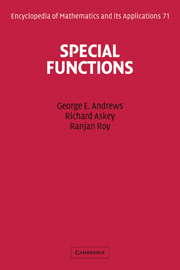Book contents
- Frontmatter
- Contents
- Preface
- 1 The Gamma and Beta Functions
- 2 The Hypergeometric Functions
- 3 Hypergeometric Transformations and Identities
- 4 Bessel Functions and Confluent Hypergeometric Functions
- 5 Orthogonal Polynomials
- 6 Special Orthogonal Polynomials
- 7 Topics in Orthogonal Polynomials
- 8 The Selberg Integral and Its Applications
- 9 Spherical Harmonics
- 10 Introduction to q-Series
- 11 Partitions
- 12 Bailey Chains
- A Infinite Products
- B Summability and Fractional Integration
- C Asymptotic Expansions
- D Euler–Maclaurin Summation Formula
- E Lagrange Inversion Formula
- F Series Solutions of Differential Equations
- Bibliography
- Index
- Subject Index
- Symbol Index
Preface
Published online by Cambridge University Press: 05 May 2013
- Frontmatter
- Contents
- Preface
- 1 The Gamma and Beta Functions
- 2 The Hypergeometric Functions
- 3 Hypergeometric Transformations and Identities
- 4 Bessel Functions and Confluent Hypergeometric Functions
- 5 Orthogonal Polynomials
- 6 Special Orthogonal Polynomials
- 7 Topics in Orthogonal Polynomials
- 8 The Selberg Integral and Its Applications
- 9 Spherical Harmonics
- 10 Introduction to q-Series
- 11 Partitions
- 12 Bailey Chains
- A Infinite Products
- B Summability and Fractional Integration
- C Asymptotic Expansions
- D Euler–Maclaurin Summation Formula
- E Lagrange Inversion Formula
- F Series Solutions of Differential Equations
- Bibliography
- Index
- Subject Index
- Symbol Index
Summary
Paul Turán once remarked that special functions would be more appropriately labeled “useful functions.” Because of their remarkable properties, special functions have been used for centuries. For example, since they have numerous applications in astronomy, trigonometric functions have been studied for over a thousand years. Even the series expansions for sine and cosine (and probably the arc tangent) were known to Madhava in the fourteenth century. These series were rediscovered by Newton and Leibniz in the seventeenth century. Since then, the subject of special functions has been continuously developed, with contributions by a host of mathematicians, including Euler, Legendre, Laplace, Gauss, Kummer, Eisenstein, Riemann, and Ramanujan.
In the past thirty years, the discoveries of new special functions and of applications of special functions to new areas of mathematics have initiated a resurgence of interest in this field. These discoveries include work in combinatorics initiated by Schützenberger and Foata. Moreover, in recent years, particular cases of long familiar special functions have been clearly defined and applied as orthogonal polynomials.
As a result of this prolific activity and long history one is pulled different directions when writing a book on special functions. First, there are important results from the past that must be included because they are so useful. Second, there are recent developments that should be brought to the attention of those who could use them. One also would wish to help educate the new generation of mathematicians and scientists so that they can further develop and apply this subject.
Information
- Type
- Chapter
- Information
- Special Functions , pp. xiii - xviPublisher: Cambridge University PressPrint publication year: 1999
